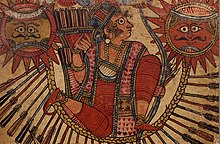fiction.wikisort.org - Character
In the Hindu epic Mahabharata, Babruvahana (Sanskrit: बब्रुवाहन) is the son of Arjuna, a Pandava prince, and Chitrangada, the princess of Manalura. Babruvahana was adopted as the heir of Manalura by his maternal grandfather and later reigned at the kingdom.
This article relies largely or entirely on a single source. (September 2022) |
| Babruvahana | |
|---|---|
 A painting of Babruvahana | |
| Information | |
| Gender | Male |
| Family | Arjuna (father) Chitrangada (mother) Subhadra (stepmother) Draupadi (stepmother) Ulupi (stepmother) Kimveka (wife) Aarusha (son) Krithika(daughter) |
| Home | Manipura |
Legend

According to the Mahabharata, Babruvahana is the son of Arjuna and his wife, Chitrangada. He is the rebirth of Tvasta.
Birth
Manipura was a kingdom in India. It was ruled by a king named Chitravahana. He had a daughter named Chitrangada, whom he named after the Madhulika flower. For multiple generations, the dynasty did not have more than one heir. Since Chitrasena did not have any other heir, he trained Chitrangada in warfare and rule. Chitrangada was well-versed in warfare and acquired the skills to protect the people of her land. The account is described in Rabindranath Tagore's play Chitra,[1] where Tagore depicts Chitrangada as a warrior dressed in male clothes.[2] Arjuna fell in love with her on account of her honesty and courage. They had a son named Babruvahana, whom Chitra reared up after Arjuna left them.[3]
Ashvamedha
Mahabharata loses mention of Chitra and her kingdom for several chapters. On the other side, the Pandavas went through various ordeals and finally winning the war against the Kauravas. Yudhishthira became the king of Hastinapura. His mind was restless since he always felt bad about killing his own kith and kin during the war. On the advice of sages, he conducted Ashvamedha yagna, where a decorated horse would be sent across the kingdom and wherever it goes unopposed, the land would be acquired by the king who sent it. Arjuna was tasked to take care of the horse. When Arjuna went to Manipura with the wandering sacrificial horse of the Ashvamedha, Babruvahana captured the horse, which, by tradition, meant war against the Pandavas. Arjuna tried to persuade Babruvahana to leave the horse as there was no enmity between Manipura and Hastinapura. Babruvanahana agreed with Arjuna, but informed him that he wished to kill Arjuna for his gurudakshina.[3]

Arjuna, reluctant to fight a young boy, left and informed a small troop of his army to convince Babruvahana to give the horse back. Babruvahana defeated the army. He also defeated Bhima, and killed Vrishaketu. Knowing this, Arjuna grew enraged as Vrishaketu had been very dear to him, as he had been his elder brother Karna's son, and took an oath to kill Babruvahana or immolate himself if he gets defeated. Arjuna fought with Babruvahana, and got the upper hand. Babruvahana defeated Arjuna, and killed him with a powerful astra. Repenting his deed after knowing Arjuna's identity, he was determined to kill himself, but he obtained from his stepmother, the Naga princess Ulupi, a gem called Nagamani, which restored Arjuna to life, with the help of Krishna. Arjuna, however, repented that he wouldn't be able to live with the remorse due to Vrishaketu's death, as he had been the one who had ordered Vrishaketu to engage in battle, and grew anxious of the reaction of Subhadra. Krishna, however, promised that he would restore Vrishaketu to life. After Vrishaketu was revived by Krishna, Babruvahana asked Vrishaketu to forgive him (which he did). Vrishaketu admired Babruvahana's skill in war. Then, the Pandavas, Ulupi, Chitrangada, Babruvahana, Draupadi, and their armies returned to Hastinapura.[3]
In popular culture
The story of Babruvahana has been made into films in Telugu in 1942 and 1964 and in Kannada in 1977. The 1964 Telugu film Babruvahana was written and directed by Samudrala Sr. and starred N. T. Rama Rao, S. Varalakshmi and Chalam.
It was made into two Hindi movies in consecutive years, Veer Babruvahan in 1951 by Nanabhai Bhatt starring Shashi Kapoor, S. N. Tripathi and Veer Arjun in 1952 starring Mahipal, Nirupa Roy, & Trilok Kapoor.
The Kannada language film, Babruvahana was written and directed by Hunsur Krishnamurthy and starred Rajkumar as Arjuna and Babruvahana in a dual role, B. Saroja Devi as Chitrāngadā, Kanchana as Ulupi and Jayamala as Subhadra.[citation needed]
Bibliography
- Mazumdar, Subash (1988). Who is Who in the Mahabharata. Bharatiya Vidya Bhavan. p. 32.
- Laura Gibbs, PhD. Modern Languages MLLL-4993. Indian Epics.
- Dowson's Classical Dictionary of Hindu Mythology
References
- J. E. Luebering (ed.). The 100 Most Influential Writers of All Time. The Rosen Publishing Group, Inc. p. 242. ISBN 9781615300051.
- Tagore, Rabindranath (2015). Chitra - A Play in One Act. Read Books Ltd. p. 1. ISBN 9781473374263.
- Bhanu, Sharada (1997). Myths and Legends from India - Great Women. Chennai: Macmillan India Limited. pp. 7–10. ISBN 0-333-93076-2.
External links
На других языках
- [en] Babruvahana
[ru] Бабрувахана
Баб(х)рувахана — герой древнеиндийского эпоса «Махабхарата», один из сыновей Арджуны, родившийся от царевны Манипура Читрангады. Позднее Бабхрувахана стал царём Манипура.Другой контент может иметь иную лицензию. Перед использованием материалов сайта WikiSort.org внимательно изучите правила лицензирования конкретных элементов наполнения сайта.
WikiSort.org - проект по пересортировке и дополнению контента Википедии

